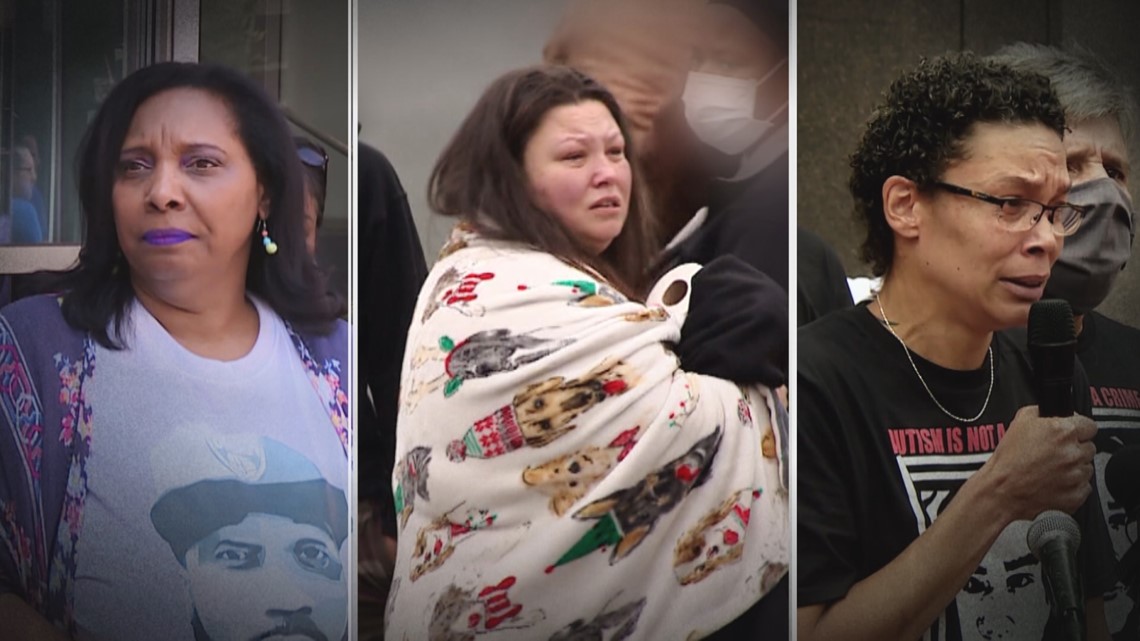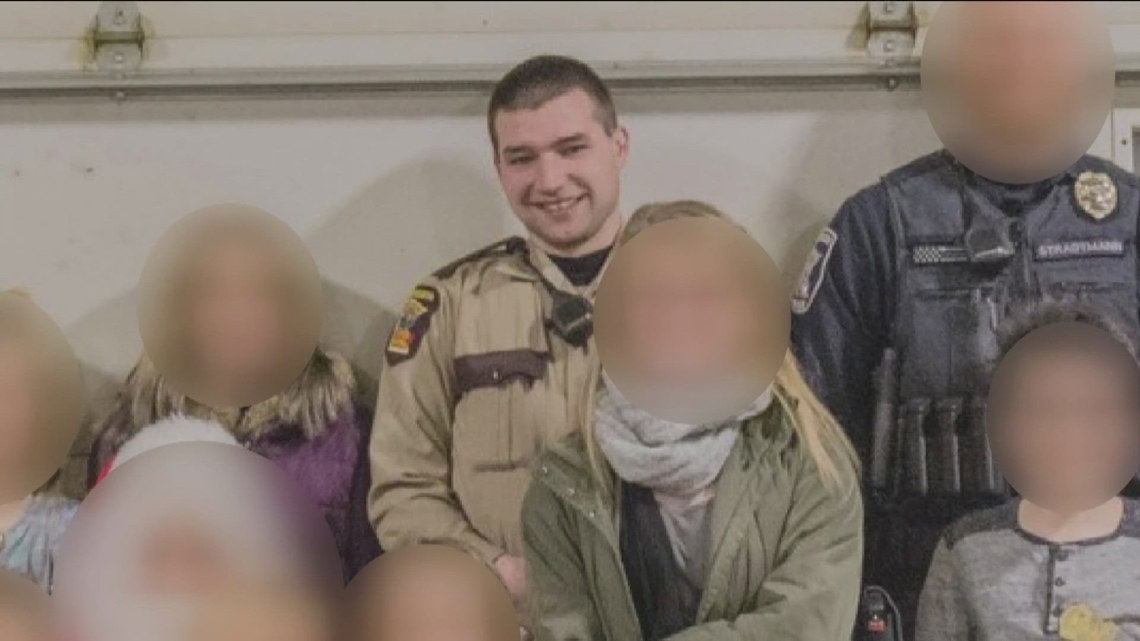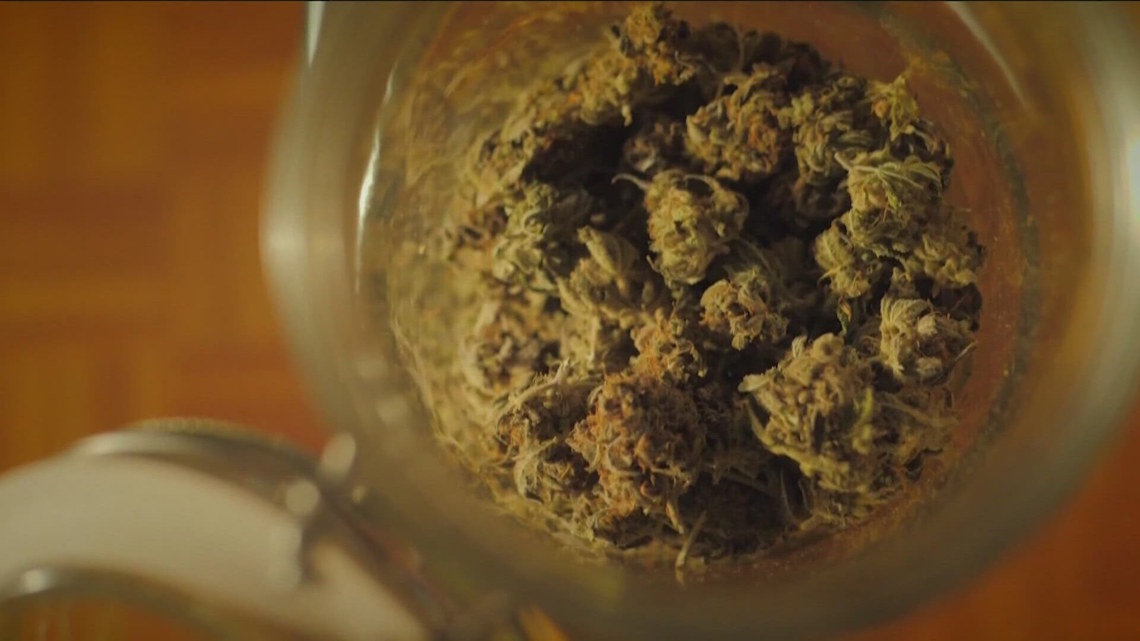Kare11
MAMA! documentary to feature three moms from Minnesota


The film follows Katie Wright, Amity Dimock and Del Shea Perry as they fight for accountability for their fallen sons.
MINNEAPOLIS — A documentary premieres this week in Minneapolis featuring three notable Minnesota moms.
The doc, MAMA!, follows Katie Wright, Amity Dimock and Del Shea Perry as they fight for accountability for their fallen sons.
Even though there are three different women and three separate incidents, there’s one shared feeling of navigating pain.
“When you lose somebody, we always say, as families, it’s like you’re in a twilight zone,” said Katie Wright.
Wright entered that zone on April 11, 2021, when her 20-year-old son, Daunte Wright, was shot and killed in Brooklyn Center during a traffic stop.
“I remember him as that kid with the big, beautiful smile,” said Katie. “The heart of gold.”
Brooklyn Center Officer Kimberly Potter claimed she mistakenly drew her gun instead of a Taser. Potter was convicted and sentenced to 16 months in prison and another eight months on supervised release.
“People say that when you lose someone, it gets easier as the years go on. We’re going on three years, and I don’t see it any different. I’ve just learned how to live my life with a piece of my heart missing,” said Katie.
Amity Dimock says a piece of her heart’s been missing since Aug. 31, 2019.
“He was kind, compassionate, and funny,” said Dimock.
Her 21-year-old son, Kobe Dimock-Heisler, was shot and killed by Brooklyn Center police officers. Family members say he was on the autism spectrum. No criminal charges were filed against the two Brooklyn Center police officers involved in his shooting.
“It still breaks my heart watching our family members and friends still till this day dealing with the grief,” said Dimock.
Grief has been a part of Del Shea Perry’s life for over five years.
“Yeah, he made some mistakes, but he was my only child and was a good person,” said Perry.
Her son, 27-year-old Hardel Sherrell, died Sept. 2, 2018 lying on his cell floor at the Beltrami County jail. His pleas for help were ignored. The state medical board stripped the license of the jail’s medical director at the time, Todd Leonard. Sherrell’s nurse had her license revoked last year. But there have been ‘no’ criminal charges, as the case still sits at the attorney general’s office.
“It’s so hard, even after five years, and I’m like, ‘I’m not going to quit,’ like, ‘God is giving me the strength,'” said Perry.
Strength is something you need when navigating gut-wrenching pain. Katie, Amity and Del Shea found strength in each other, thanks to the MAMA! documentary.
“This is from one hurting mother who’s lost her only child to another hurting mother: I got your back,” said Perry.
The documentary is directed by Sofia Drai and Carl Reid. Niko Georgiades, the film’s associate producer, says the film took almost three years to make. He also says the documentary is a journey.
“You’ll see the mothers dealing with the death. What do they do next? How do they push forward,” he said.
Filmmakers say they’re curious to see how this documentary will be received.
“I hope the public still cares,” said Georgiades. “It was very open to supporting Black folks. Now, I feel like we’re almost at the opposite end of that.”
These three mothers hope the public still cares since they never stopped. Turning their pain into passion has helped.
For Amity and Katie, their new passion is working on police reforms. They’ve also teamed up to create a nonprofit that supports other families of loved ones killed by police.
For Del Shea, her new passion is Be Their Voices. Her nonprofit ensures everyone who goes to a Minnesota jail is not neglected or leaving in a body bag.
“I would just hope that people are more understanding and maybe a little more open-minded. Instead of just assuming we’re anti-police,” said Dimock.
“We definitely need police. We just need them where it’s going to be effective and safe for both police and community,” said Wright
“This should be something that opens everyone’s eyes to say, what can we do,” said Perry.
Three different women, three separate incidents, one shared feeling of navigating pain, and now one shared feeling of navigating justice together.
“I will always fight until I can’t fight anymore,” said Wright.
This documentary is available on multiple platforms, including:
- AT&T U-Verse
- DirecTV
- Dish Network and Sling TV
- iN DEMAND (Spectrum, Comcast)
- Vubiquity
- Hoopla – libraries
- Amazon
- Apple TV
- Vudu
- Xbox
- Google Play
- YouTube Movies
There will also be an in-person premiere at the Capri Theater Friday at 6 p.m. For information about the event and how to buy tickets, click here.
Watch the latest local news from the Twin Cities and across Minnesota in our YouTube playlist:
Kare11
Former MN State Trooper Shane Roper, charged with manslaughter, requests case dismissal


The former state trooper is charged with the killing of 18-year-old Olivia Flores.
ROCHESTER, Minn. — Editor’s Note: The above video first aired on 8/26/2024.
The former Minnesota State Patrol trooper charged with the killing of an 18-year-old girl is asking for his case to be dismissed and a change of venue for it to be moved out of Olmstead County.
The former trooper, Shane Roper, and his attorney argue that the “extensive and regional media coverage” jury pools are likely tainted and a fair trial could not be conducted in Olmstead County.
According to a criminal complaint, Roper was driving 83 miles an hour, full throttle with his lights and siren off when he sped through the busy Rochester intersection by the mall and slammed into 18-year-old Olivia Flores.
Records show he’d been suspended twice and reprimanded twice more for similar behavior.
The order from Roper’s attorney also asks the court to preclude the introduction of any evidence related to prior speeding or traffic incidents involving Roper.
Roper and his attorney are asking for charges 1-8 to be dismissed for “lack of probable cause.”
Kare11
‘This doesn’t change anything’ Biden apology for Native American boarding schools draws mixed reaction


For the very first time, a sitting President has apologized for boarding schools that tore Native Americans apart and led to countless cases of abuse and death.
MINNEAPOLIS — During his first presidential visit to Indian Country on Friday, Joe Biden delivered a historic and emphatic apology, acknowledging 150 years of abuse, trauma and death inflicted by Native American boarding schools.
“I formally apologize, as President of the United States of America, for what we did,” Biden said. “It’s one of the most horrific chapters in American history,” said President Biden.
Christine Diindiisi McCleave, former CEO of the National Native American Boarding School Healing Coalition, spent years documenting the stories of boarding school survivors and advocating for justice and accountability by the US leaders.
“My family has two generations of boarding school history that I know of,” McCleave said, during an interview for the KARE 11 Series “Lost History,” which detailed the impact of boarding schools in Minnesota.
During his speech on Friday, President Biden acknowledged the work of the Native American Boarding School Healing Coalition and efforts to better understand the horrors and generational trauma the schools inflicted.
“Generations of Native children stolen, taken away to places they didn’t know,” Biden said. “Children abused emotionally, physically and sexually abused, forced into hard labor, some put up for adoption without the consent of their birth parents. Some left for dead in unmarked graves.”
Christine Diindiisi McCleave: “I struggle with what I’m supposed to say and what I really feel.”
Kent Erdahl: “Why do you say that?”
McCleave: “Well, because today is historic and while I am grateful to see this progress being made. I am also realizing just how short it falls… from real reparations, from real healing.”
She knows she’s not the only one who feels that way. The National Native American Boarding School Healing Coalition surveyed survivors in 2016.
“The thing they wanted the least was an apology because, while it is an acknowledgement, it doesn’t change anything,” McCleave said. “The majority of them said they wanted a truth commission. Trying to find out exactly how many boarding schools existed, how many children went to those boarding schools and how many children died at those schools.”
She says an investigation led by Interior Secretary Deb Haaland, whose grandparents and mother were among those sent to these schools did help better understand that impact, but it only scratched the surface.
“They were only able to investigate the Federal Government’s records,” McCleave said. “Half of these schools were run by churches, of various denominations, and so a truth commission would be able to look into those records as well.”
“Nearly one thousand documented Native child deaths, though the real number is likely to be much, much higher,” Biden said on Friday.
Bills in both the House and the Senate could make that commission a reality, but until that happens, Christine says she can’t ignore the politics of an apology that took place in a swing state, just days before an election.
McCleave: “This apology doesn’t change anything for my mother, who was abused as a child. Of for my grandfather who was a abused at a Catholic Indian Boarding School.”
Erdahl: “Do you hope that this isn’t just an election ploy?”
McCleave: “I hope that this apology actually helps that bill get passed. Native American people are no stranger to being political pawns, so you know what, if this is an election ploy so be it, I hope something good comes out of it.”
Kare11
Hazelden addiction, recovery experts host first cannabis summit


Researchers spoke about increased THC potency and the impact on youth brain development.
ST PAUL, Minn. — Whether purchased from dealer or dispensary, weed has become more potent over the years. In 2022, the federal government reported THC levels more than tripled since 1995.
Hazelden Betty Ford Foundation Graduate School addressed this Friday at its first cannabis summit. Attendees primarily included the nonprofit’s graduate students as well as undergraduate students from nearby universities.
Speakers included researchers from the University of Minnesota, Hamline University, Mitchell Hamline School of Law and others.
Ken C. Winters, is a senior scientist at the Oregon Research Institute’s Minnesota location and a consultant for the University of Iowa’s Native Center for Behavioral Health.
He covered the interplay between youth, cannabis and health.
“It’s not your grandparents’ marijuana these days,” Winters said to the students.
The Hazelden Betty Ford Foundation Graduate school offers a 2-year program, in which students like John Ryan and William Barksdale are earning counseling degrees in substance use and mental health.
“The takeaway would be that you’ve seen potency levels increase quite a bit, and the research is trying to keep pace with that,” Barksdale said.
“As we saw today, marijuana use has gone up in the last couple years such that it’s eclipsed alcohol use in terms of daily users in the United States,” Ryan added. “It’s is much more concerning now because there is such a higher degree of potency that’s available on a wider basis.”
Ryan says it’s especially concerning for youth.
“The subject of the last presentation, which I found quite engaging, was the specific effects on adolescents,” he said. “So, teenagers and people within that young adult range, the 18 to 25-year-olds because that’s generally the period the most brain development takes place. So that’s the area of concern … but it’s still something that I think is being studied and being observed in the first stages of that.”
Kevin Doyle provided opening remarks. He has more than 35 years of experience as a licensed professional counselor. Today, he’s president and CEO of the grad school.
“Potency, dosage, frequency of use, availability, legal cutoffs in terms of age, all those things need to be talked about,” Doyle said. “Adolescent brain development. We know more and more about that every year. Sometimes it seems like every day we learn more about that.”
“How do we as a treatment community need to be prepared to respond?”
The summit comes as Minnesota works to set rules for the cannabis industry after legalizing the drug for recreational use last year. A public comment period is expected later this fall.



